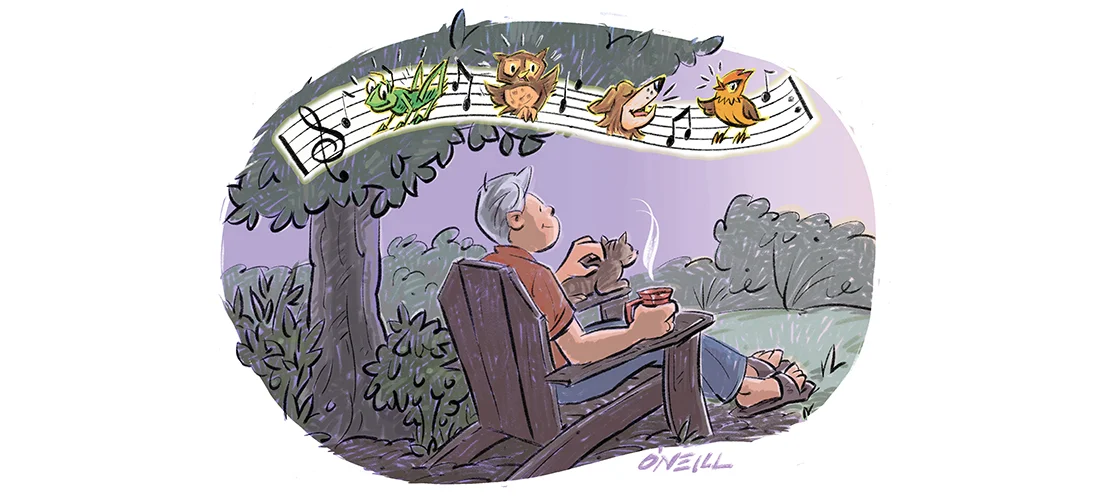The quiet of nature
July 30, 2024

In an increasingly loud world, maybe we should be still and listen to nature.
by Jim Dodson
illustration by Gerry ONeill
It’s two hours before sunrise and, per my daily morning ritual, I’m sitting with my old cat, Boo Radley, in a wooden chair beneath the stars and a shining quarter-moon.
Today’s forecast calls for another summer scorcher. For the moment, however, the world around me is cool and amazingly quiet.
It’s the perfect moment to think, pray or simply listen to nature waking up.
In an hour or so, the world will begin to stir as folks rise and go about their daily lives. Nature will be drowned out by the white noise of commuter traffic, tooting horns and sirens.
But, for now, all I hear is the peaceful hoot of an owl somewhere off in the neighborhood trees, the fading chirr of crickets and the lonely bark of a dog a mile or two away. It’s amazing how sound carries in such a peaceful, quiet world.
Ah, there it is, right on cue! The first birdsong of the new day. I recognize the tune from a certain gray catbird that seems to enjoy starting the morning chorus. Soon, the trees around us will be alive with the morning melodies of Carolina warblers, eastern bluebirds and the northern cardinals. What a perfect way to lift a summer night’s curtain and herald the dawn!
Unfortunately, it’s a sound that Earth scientists fear may be vanishing before our very ears.
On a planet where many are concerned about the impacts of global warming, declining natural resources and vanishing species, it seems to me that noise pollution and the disappearing sounds of the natural world might be among the most worrying impacts of all.
A recent article in The Guardian alarmingly warns of a “deathly silence” some scientists claim results from the accelerating loss of natural habitats around the globe. The authors note that sound has become an important measurement in understanding the health and biodiversity of our planet’s ecosystems. “Our forests, soils and oceans all produce their own acoustic signatures,” they write, noting that the quiet falling across thousands of habitats can be measured using eco-acoustics. They cite “extraordinary losses in the density and variety of species. Disappearing or losing volume along with them are many familiar sounds: the morning calls of birds, rustle of mammals through undergrowth and summer hum of insects.”
Bernie Krause, a veteran soundscape recordist who has devoted more than 5,000 hours to recording nature from seven continents over the last 55 years, estimates that 70% of his archive is from habitats that no longer exist.
As quiet natural places are drowned out by the sounds of freeways, cellphones and the daily grind of modern life, fortunately, a nonprofit group called Quiet Parks International is working to identify and preserve sacred quiet places in cities, wilderness areas and national parks, where all one hears — for the moment, at least — is the beat of nature, the pulse of life in the wild.
“Quiet, I think, holds space for things that we can’t verbalize as humans,” the group’s executive director Matthew Mikkelsen recently told CBS News. “We use silence as a way to honor things.” Quiet, he notes, is becoming harder and harder to find these days, even in the most remote wilderness or within the depths of the national parks. “Every year we see more and more data to reaffirm what we’ve known for a long time — that quiet is becoming extinct.”
Perhaps because I grew up in a series of sleepy small towns across the lower South, places where I spent most of my days wandering at will in nature, I’ve been groomed to be a seeker of natural silence and quiet places in my life.
The first decade of my journalism career was spent in major cities, embedded in the cacophony of busy streets, which explains why I bolted for the forests and rivers of northern New England the moment I had the chance to escape honking horns, blasting radios, screaming sirens and even background music in restaurants, a personal annoyance I’ve never quite fathomed.
Perhaps I’ve been spoiled by traveling in France and Italy and other ancient places. There, cafes and bistros are generally meant to foster a relaxed, slower pace of life through the auspices of good food, lingering conversations and woolgathering as one watches the harried world pass by.
While living on a hilltop near the coast of Maine, surrounded by 200 pristine wooded acres of beech and hemlock trees, my young children and I often saw and heard wildlife — whitetail deer, pheasants and hawks, a large female porcupine, and even (once) a young male moose. At the edges of our vast lawn, I created feeding areas of edible native plants for our wild neighbors. On frigid winter nights, I put on my Elmer Fudd jacket and toted 50-pound bags of sorghum out to that feeding spot by the edge of the woods, where deer and other critters could be seen dining on a moonlit night. The eerie late-night sound of coyotes calling deep in the forest reminded us that we were the newcomers to their quiet keep.
One reason I love the game of golf is because golf is a two- or three-hour adventure in nature, where the simple elements of wind, rain, sand and water provide an existential challenge to mind and body. As a kid, I learned to play golf alone, walking my father’s course in the late afternoon, when most of the older golfers had gone home. I came to love “solo golf” at a time of day when the shadows lengthened and the sounds of nature began to reawaken creatures great and small.
Golf courses, like libraries, are meant to be quiet places — which makes the recent trend of golf carts equipped with digital music systems particularly bothersome to a lover of nature’s quiet sounds.
Pause for a moment and just think what one can do in the quiet:
Read a good book.
Admire a sunset.
Rest and recover.
Take an afternoon nap.
Watch birds feed.
Write a letter.
Talk to the universe.
Say a prayer.
Grieve — or feel gratitude.
Think through a problem.
“In quietness, are all things answered,” says the book A Course in Miracles.
My heart aches when I hear that the world’s natural places may be going silent.
A world without nature’s quiet sounds would be a very lonely place.
Hopefully, we’ll learn to listen before it’s too late. SP
Jim Dodson is a writer in Greensboro.
